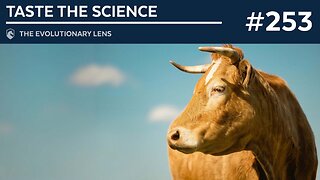Premium Only Content

Hungry monkey
monkey, in general, any of nearly 200 species of tailed primate, with the exception of lemurs, tarsiers, and lorises. The presence of a tail (even if only a tiny nub), along with their narrow-chested bodies and other features of the skeleton, distinguishes monkeys from apes. Most monkeys have a short, relatively flat face without great prominence of the muzzle, although baboons and mandrills are notable exceptions. The vast majority of species live in tropical forests, where they move on all four limbs. All but the durukuli of tropical Central and South America are active during the day, moving frequently in bands as they search for vegetation, birds’ eggs, smaller animals, and insects to eat. Monkeys are capable of sitting upright, and, consequently, their hands are freed for many manipulative tasks. Except for a few Old World forms, monkeys are predominantly arboreal, leaping from limb to limb in their travels among the trees. Their hands and feet are both used for grasping and typically have five digits, the thumb and big toe being divergent from the others. Commonly, the digits have flattened nails, but the marmosets have claws on all digits except the big toe, which bears a nail. On the ground, monkeys walk with the entire sole of the foot touching the ground but with the palm of the hand raised. They almost never walk on two legs (bipedally) and can stand erect for only short periods, if at all.
-
 11:54
11:54
Professor Nez
14 hours ago🚨CHILLING REVELATION: Tucker Carlson Reveals Dems NEXT PLAN to STOP Trump!
163K61 -
 6:51
6:51
Colion Noir
14 hours agoI have Something To Say To Gun Owners
103K27 -
 1:18:24
1:18:24
Glenn Greenwald
18 hours agoLiberals Encourage Family & Friends To Separate Over Political Disputes; Segment Debut Of System Pupdate: Profiles Of Rescued Dogs | SYSTEM UPDATE #373
158K390 -
 1:24:53
1:24:53
Flyover Conservatives
1 day agoMarketing Madness or Manipulation? The War on Western Identity - Alex Newman; Economic Update - Dr. Kirk Elliott | FOC Show
77.2K7 -
 1:15:05
1:15:05
PMG
1 day ago $14.23 earned"Big Pharma EXPOSED: The HIDDEN Cures They Tried to Bury"
63.7K18 -
 3:26:12
3:26:12
Tundra Gaming Live
16 hours ago $3.95 earnedThe Worlds Okayest War Thunder Stream
51.2K1 -
 1:49:52
1:49:52
VOPUSARADIO
23 hours agoPOLITI-SHOCK! Back To Back Guests: Rebekah Koffler & Dr. Michael Schwartz
37.9K1 -
 59:44
59:44
The StoneZONE with Roger Stone
15 hours agoWill the Perps of the Russian Collusion Hoax Face Justice? | The StoneZONE w/ Roger Stone
49.7K18 -
 2:25:06
2:25:06
WeAreChange
17 hours agoCOMPLETE COLLAPSE: Media Spiraling Into OBLIVION As It Tries To Take Out Elon and Trump
90K16 -
 1:56:08
1:56:08
Darkhorse Podcast
22 hours agoTaste the Science: The 253rd Evolutionary Lens with Bret Weinstein and Heather Heying
90.8K88